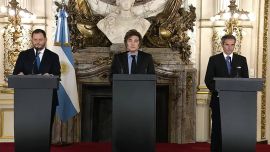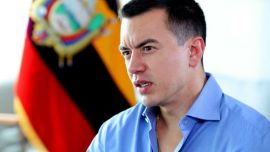Far removed from her previous day-to-day work at the Security Ministry, Patricia Bullrich has been one of the quickest ex-officials to reinvent herself. Anointed to the PRO helm, she has founded the Instituto de Estudios Estratégicos en Seguridad (Institute for Strategic Security Studies), where, together with other exofficials, she prepares reports and papers for Cambiemos and the public sector.
Who offered you the PRO chair?
Mauricio [Macri]. It took me by surprise because I was going to talk with him in November after the elections about the things which needed winding up in each ministry. I took advantage of that to talk politics – I wanted to tell him that in certain aspects, we would have liked a greater level of participation. The only place where that was respected was in the City – with [Mayor] Horacio [Rodríguez Larreta] there was always a mechanism for that. I said: “Well, I’d like to discuss that. And he replied: “OK, but I want you to head PRO.”
There hasn’t been much work on the ground during the last four years in PRO, has there?
We should have taken better advantage of our time in government to create a greater level of territorial insertion because being in government allows you to travel a lot and make many contacts. We were a government which gave great importance to the provinces and we moved around. But we did not translate that into a territorial construct which paid off, either in terms of candidates or monitoring the voting. That’s one of the areas where we are going to have to dig deep. Both those who participated and who want to participate are calling for that. What will Macri’s role be? He’s naturally recognised as the honorary chairman of PRO but he’s above all that, he leads the Cambiemos (coalition), which is a broader structure.
I phoned him and he asked me for greater scope, to expand territorially and represent the 41 percent [sic, Cambiemos took 40.28 percent] who voted for us but to grow too because that’s not enough to return to government. To work on a new model of representation.
What style of opposition do you envisage?
One would always like to be a constructive opposition but this government is turning us into a punch bagas the enemy, as when Aníbal Fernández spoke of that “imbecile Macri,” we’re not going to allow that. Or the Mothers [of Plaza de Mayo] saying: “Now Government House has been liberated because before it was a dictatorship” – these are not admissible things.
If they say we did everything badly, that predisposes you to a more intransigent opposition.
Should Marcos Peña take his final leave from PRO?
At this point in time it’s important to enter a phase where we all reconsider the role we played, the problems of government, the situations generated, why we were so misinformed before the PASO [primaries], what made us leave the most difficult reforms to 2017 and not 2015, when we had recently taken over.
Peña is somebody who will surely use this time to do some thinking. He’s young and should know how far he needs to be from the hotspots at this point.
How do you envisage the future of the Juntos por el Cambio [coalition]?
It will be institutionalised. We need to be clear how it works – how we choose candidates without PASO or to use the primaries if they continue.
What did you think of [your successor as Security Minister Sabina] Frederic wanting to review the Border Guard’s handling of the [Santiago] Maldonado case?
This was a Kirchnerite banner raised to topple us and also because the minister and Alberto Fernández have a psycho-ideological dependence on [Horacio] Verbitsky. The whole campaign to say that Maldonado was the first desapareSaturday, January 25, 2020 cido to go missing under Macri was headed by Verbitsky.
Also responsible was Félix Crous [who now heads the Anti-Corruption Office], who inserted testimony without witnesses, which was quashed by the courts as not serious. The idea is to try and reconstruct the narrative which they could not previously sustain.
And the Nisman case?
That’s a commitment of Alberto Fernández to Cristina [Fernández de] Kirchner.
Firstly, they’re always saying that they know the report of the Border Guard experts when I don’t know it, I don’t know whether it’s good or bad. If you aud it the protocol of the report, they’re obviously going to say that everything was wrong.
It is a case which compromises the vice-president very heavily – it exposes the pact with Iran because there is a death and to be caught in the middle of that death is very heavy. Fernández is going to pay an enormous political price – he spoke to Nisman the Thursday before his death and it was he who said that what Cristina was doing was “delirious” with the pact with Iran as the most important proof of that.
We are paying the price for Fernández being elected to demolish this case. Will we be allowed to know all the telephone calls around Nisman and will the courts?
What do you think about the public dispute between [Buenos Aires Province Security Minister Segio] Berni and [Security Minister Sabina] Frederic?
The lack of convergence within the government regarding ideas on security is striking. Many of the things which Berni said were known in advance, what’s striking is that it’s all been made public. Berni vindicates many of the policies we pursued such as the use of Taser stun guns. Looks like a fight to see who stamps their foot hardest.
























Comments